Hawzah News Agency-For many times Imam Musa Al-Kadhim (A.S) explicitly introduced his eldest son "Ali" as his immediate successor to accede to the divine position of Imamate.
Subsequent to the martyrdom of his father in Baghdad, on the 25th of Rajab 183 A.H. / 1 September, 799 A. D. in the prison of Abbasid caliph, Harun al-rashid, he attained the holy position of Imamate, when he was thirty five years old, and he held that divine position for twenty years.
Three Abbasid caliphs were his contemporaries: for the first ten years Harun al- Rashid, for next five years Amin and finally for the last five years Ma'mun.
Why Ma'mun invited Eman Reza (A.S.)
After the death of Harun (b, 766 A.D., r. 786-809 A.D.) in 193 A.H./ 809 A.D., Ma'mun fell into conflict with his brother Amin (b 787 A.D., r. 809-813 A.D.), which led to bloody wars and finally the assassination of Amin in 813 A.D./ 198 A.H., after which Ma'mun became caliph.
The Umayyad and the Abbasid caliphs were afraid of the Holy Imams (A.S.), who were publicly recognized as the true and worthy successors of the Messenger of Allah (S.A.W.). The Holy Imams (A.S.), were therefore constantly persecuted and tortured by the ruling caliphs of the time.
Ma'mun thought ot finding a new solution for these difficulties which his Abbasid predecessors had not been able to solve. Ma'mun contrived to invite Imam Reza (A.S.)to Marw, (the city where Ma'mun's seat of caliphate was located) with the evil intention of making false friendship with His Holiness. Thus the cruel Caliph intended to have a direct eye on His Holiness.
In order to have this decision put into effect, Ma'mun forcefully exiled Imam Reza(A.S) from Medina to Marw. On his departure from Medina, Imam Reza (A.S.) gathered the members of his family and enjoined them to shed tears for his last journey with no return. Holy Imam (A.S.) did not take any member of his household with him to Marw. His Holiness intended to make the people aware of the exile that Ma'mun had intended for him.
Towards Khorasan
According to Ma'muns' commands the direction of Imam Reza (A.S.) caravan from Medina to Marw was predetermined. He arrived in Marw on the 10th of Shawwal in 201 A.H. / 1 May 817 A.D., via Basrah, Khorramshahr, Ahwaz, Rey, Neyshabur, Sanabad and Sarakhs. Throughout his long journey, the Holy Imam (A.S.) was cordially received by the people living in those cities and villages on the route. When His Holiness arrived in Neyshabur he narrated a Hadith Qudsi before an estimated crowd of 120,000 which also included thousands of distinguished scholars and traditionists. This historical and the most famous Hadith Qudsi in known as "Silsilat al-Dhahab". Imam Reza (A.S.) confirmed that worshipping God will be counted as a perfect procedure when it is based on the obedience of the Immaculate Holy Imams (A.S.). This historical statement of Imam Reza (A.S.) implied the presentation and assertion of the Imamate (Socio- religious leadership) of His Holiness.
Imam-e- Zaamin(A.S.)
The 8th Shi'ite Imam, Imam Ali ibne Musa ar-Reza (A.S.) is also called as Imam-e-Zaamin(A.S.).When Muslims go on journeys they take with them something called Imam-e-Zaamin (another name for Imam Reza (A.S.)) which is some money tied in a cloth. This tradition probably came from the time of Imam Reza (A.S.) when people used to carry money with them especially because it had Holy Imam's (A.S.) name on it. As Ma'mun,the Abbasid caliph the contemporary of Imam Reza(A.S.), had coins minted with the name of Imam Reza (A.S.) on them, it was very easy for the Muslims to carry the name of Holy Imam (A.S.) with them, especially when they went on journeys.
Imam Reza (A.S.) is also known as Imam-e- Zaamin (A.S.). Zaamin means "The Guarantor". One day when Imam Reza (A.S.) was on his historical journey from Madina to Marw(Khurasan),while in a jungle the Holy Imam(A.S.) came across a hunter who was about to kill a deer. The deer was trying to get away and when she saw Holy Imam (A.S.), she said something to him. Holy Imam (A.S.) asked the hunter to free the deer so that she could go and feed her little baby deer who were very hungry. Imam Reza (A.S.) also told the hunter that once the deer had fed her babies she would come back. The hunter allowed the deer to go because Holy Imam (A.S.) had told him to, but he did not think the deer will come back. But Imam Reza (A.S.)) waited with the hunter until the deer returned with her young ones. The hunter was amazed on witnessing this miraculous event and he set the deer free as a mark of respect for Imam Reza(A.S.).After this historical event Imam Reza(A.S.) became famous as Imam Zaamin(A.S.).
The most famous artist of the contemporary world, Mahmud Farshchiyan has depicted this historical event in this beautiful masterpiece iconograph entitled "Zaamin-e-Aahu"(The Guarantor of the Deer).
Successorship to Caliphate
His Holiness was welcomed at Marw by the caliph himself and by Fazl ibn Sahl and some distinguished Abbasid nobles in a place a few leagues outside the metropolis. After some days, Ma'mun offered Imam Reza (A.S.), first the caliphate, His Holiness seriously rejected Ma'mun's proposal. Then Ma'mun proposed Imam to accept the successorship to caliphate, the Holy Emam (A.S.) turned down this proposal also but he was finally forced to accept the successorship to caliphate. The Holy Imam (A.S.) put forward certain conditions that he would not interfere in Governmental affairs or in the appointment or dismissal of government agents.
Ritual of Fitr Prayer
In the late Ramadan 202 A.H./ March 817 A.D., Ma'mun requested Imam Reza (A.S.) to conduct the religious service of the celebration of "Fitr Prayers" (Festival at the end of the month of Ramadan) in Marw.
The Holy Imam (A.S.) accepted only with the condition to perform the related ritual just on the basis of the method of the Holy Prophet of Islam (S.A.W.).
Early in the morning of the celebration day of "Fitr", Holy Imam (A.S.) appeared in plain clothing and bare-footed before that congregation and glorified God loudly; saying "Allah Akbar" (God in the Greatest of all.). From every direction of the city the call "Allah Akbar" could be heard because the congregation present there followed His Holiness and shouted "Allah Akbar".
Ma'mun was deeply alarmed by the magnificence and splendor of that demonstration and requested Holy Imam (A.S.) to cease the continuation of that ritual.
The Holy Imam’s (A.S.) Scholarly Discourses
Ma'mun often managed sessions of debates to be held in his own royal palace and celebrated scholars of various religions were invited there to exchange and discuss their different views on religious issues, Imam Reza (A.S.) was always victorious in all those debates and soon his opponents recognized the scientific status of His Holiness. Imam Reza (A.S.) directed Muslims to the right path and removed deviated views of the antagonists who endeavored to distort Islam. In this way the Holy Imam (A.S.) safeguarded and propagated the principles of Islam.
The Holy imam’s (A.S.) Martyrdom
The vicious caliph was scared of the ever-increasing Holy imam’s (A.S.) popularity. Thus he decided to eliminate the Holy Imam (A.S.).
In 203 A.H./ 818 A.D., Ma'mun first imprisoned Imam Reza (A.S.) in Sarakhs. Then the Holy Imam (A.S.) was taken to Sanabad and confined in the palace of Humaid bin Qahtabah. During the morning of the last day of the month of Safar 203 A.H./ 818 A.D., the Holy Imam (A.S.) was poisoned by Ma'mun in that palace. The Holy Imam (A.S.) was seized with intensive pain and languor and in the evening of the same day the holy soul of the innocent Holy Imam (A.S.) departed to heaven. The Holy Imam (A.S.) was buried in the solitude of night at the same place of the palace which His Holiness had prophesied during his first visit to Humaid bin Qahtabah's palace at Sanabad in 201 A.H. / 817 A.D.
Once a small village called Sanabad soon transformed into a great metropolis by the presence of the holy shrine of Imam Reza (A.S.) called as Mashhad al-Reza (tomb sanctuary of Imam Reza (A.S.)., also briefly called Mashhad which is also one of the most extensively visited pilgrimage centers in the world.
Compiled by : Dr Hyder Reza Zabeth

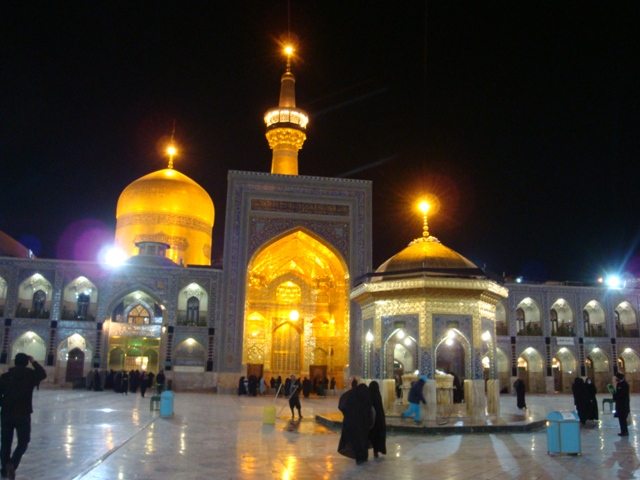
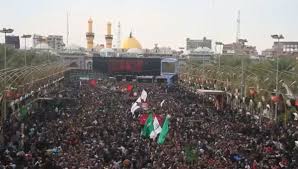
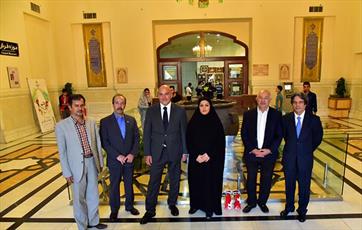
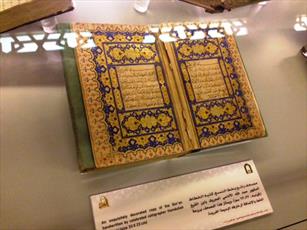
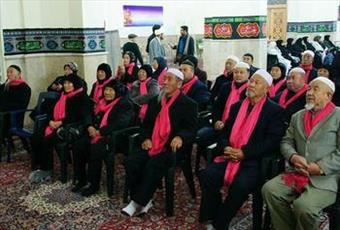
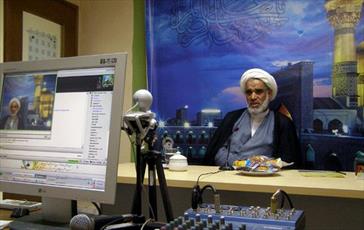
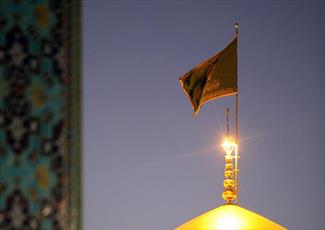
Your Comment